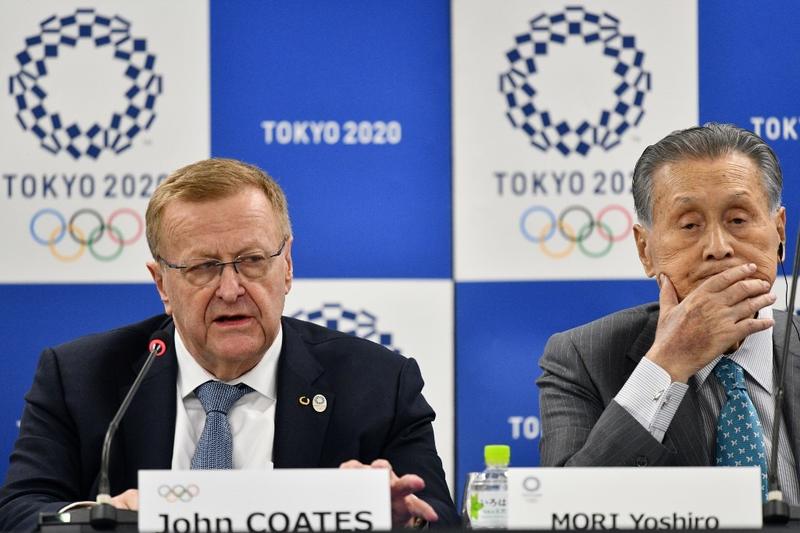 John Coates (left), Chairman of the Tokyo 2020 Olympic Games coordination committee and President of Australian Olympic Committee, and Tokyo 2020 president Yoshiro Mori (right) attend a press confernce following the International Olympic Committee (IOC) project review meeting in Tokyo on Feb 14, 2020. (KAZUHIRO NOGI / AFP)
John Coates (left), Chairman of the Tokyo 2020 Olympic Games coordination committee and President of Australian Olympic Committee, and Tokyo 2020 president Yoshiro Mori (right) attend a press confernce following the International Olympic Committee (IOC) project review meeting in Tokyo on Feb 14, 2020. (KAZUHIRO NOGI / AFP)
MELBOURNE - If bickering over funding was an Olympic sport, Australia would be in line for a gold that might help slow the nation’s seemingly inexorable slide down the medals table.
While the Australian Sports Council and Australian Olympic Committee might be expected to be working hand-in-glove to put athletes on podiums they are instead squabbling in public over the use of hundreds of millions of dollars in taxpayer funding for high-performance sport
Just five months before the Tokyo Games begin, a war of words has broken out between the Australian Sports Council (ASC), the government agency in charge of disbursing funding, and the Australian Olympic Committee (AOC), which pays for athletes to compete at the Games.
While the organizations might be expected to be working hand-in-glove to put athletes on podiums they are instead squabbling in public over the use of hundreds of millions of dollars in taxpayer funding for high-performance sport, which the ASC has said is up for review after the Olympics.
ALSO READ: Mayor candidate: London can host 2020 Games if moved over virus
“The sports don’t want to know if their funding is good for the next six months,” AOC President John Coates told reporters in Sydney this week.
“They want to know for the next four years, so they can go ahead and employ coaches.”
At the turn of the century, Australia prided itself in punching above its weight at the Olympics but medal counts have plummeted since 2004.
After finishing fourth at Athens with 17 golds among its 50 medals, Australia dropped to sixth in Beijing (14 golds, 46 medals) and eighth at London (eight golds, 35 medals).
Four years ago at Rio the country was 10th with eight golds and 29 medals — its lowest Olympic tally in 28 years.
With each quadrennial setback, the opprobrium has grown and relations have soured dramatically between the AOC and the sports-funding bureaucracy.
Barbarians at the gate
The year after Rio, Coates accused ASC Chairman John Wylie, an investment banker, of a campaign to undermine him during a failed challenge for the AOC presidency.
Two years ago, Coates thundered that the ASC and other “barbarians at the gate” were seeking to raid the AOC’s A$150 million (US$99 million) foundation, which helps cover athletes’ training and costs at the Games.
The pair no longer speak to each other and instead use national media to make claim and counter-claim.
The Australian, a conservative newspaper owned by Rupert Murdoch’s News Corp, has launched a concerted attack on the ASC’s spending on overheads and alleged the agency is set to slash funding for sports that have low medal-winning prospects.
While the ASC has spent millions on consultants and management training programs, the Australian Institute of Sport in Canberra is now reported to be a “ghost town” due to funding cuts, having once drawn global admiration as a cutting edge, high-performance facility and sports science hub.
Wylie has defended the ASC’s performance and its top executives, whose salaries outstrip annual grants given to minor sports federations like weightlifting and badminton.
“We make no apology for hiring quality talent, wherever they reside, to provide the best possible support for athletes and our goals,” he wrote in a column published by The Australian.
READ MORE: 76ers' Brett Brown to coach Australia at Tokyo Olympics
Wylie called for an end to the negative commentary and for the country to support the athletes with a “genuine unity ticket”.
Coates responded that the AOC was cooperating with the ASC, but then showed his relationship with Wylie still needs work.
“As for the rest, these are mutterings of a man appearing to suffer from relevancy deprivation,” Coates said.


